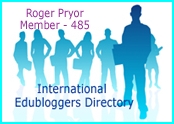An integration plan for digital migrantsÂ
The 2006 Andrew Olle lecture was delivered by Senator Helen Coonan on Friday night. This full text of her speech can be read here
Senator Coonan uses the ‘Digital Native; Digital Immigrant’ analogy made famous by writer Marc Prensky. You can read Marc Prensky’s piece from 2001 here
Senator Coonan’s address is a great mainstream recognition of the democratisation of knowledge management which has become increasingly possible with web 2.0 applications. We should seek to make the best use of this trend within a field such as education where we are actually working directly with Digital Natives.
In more recent times, information distribution became the domain of those who could afford to own the airwaves. Now anyone with a fast broadband connection and a laptop can create a movie or a blog and share it with the world.
And, there are some parallel thoughts in this with the sort of ‘paradigm shifts’ needed in the minds of educators around how we productively harness new technologies and knowledge acquisition and management.Â
When the Internet was first invented and innovative people began to contemplate how to make money out of it, it was assumed the Net would simply be a distribution pipe for content as opposed to something that users might be able to influence.
But quickly it has become the domain for largely untrammelled free thought and free speech. It has been shaped by its users and it responds to the changing needs of consumers. Its potential is limitless. And the faster broadband speeds are, the more dynamic its uses.
Perhaps understandably, it is simply the unknown dimensions of participatory media that most alarms both the traditional media and even the political class. And if it doesn’t, they’re in denial.
I appreciate that some in the media resist change, are risk averse and sincerely wish to preserve the status quo or even turn back the clock. But stemming the tide of technology that has fundamentally altered the way we communicate is impossible. And to be frank, it is undesirable.
The world has well and truly moved beyond being able to control the news diet of a passive audience or insisting on how it is to be consumed. And when high speed networks are now being rolled out across the nation, primed to deliver a triple play of voice, data and video it is increasingly apparent that those whose business is in old media must adapt, innovate and invest in order to survive.
Are we we constantly reassessing the possibilities of what we can do in this complex environment where we need to structure environments to meet the needs of ‘digital natives’, communicate the positive outcomes to ‘digital immigrants’ and do the work with a workforce which contains many who see themselves more as ‘digital aliens’ ?
If we are serious about operating with a ‘moral imperative,’ then the answer needs to be ‘yes.’
Leave a Reply
You must be logged in to post a comment.



Recent Comments